
Telling People About Your Chronic Illness: 3 Ways to Feel Seen and Known
When I was diagnosed with my chronic illness, I was only 19 years old. Until then, I felt like I was just a “normal” college kid. I joined a sorority, lived in the dorms, went out with my friends on the weekend, and was starting to figure out independent life away from my hometown.
But, suddenly I wasn’t “normal” anymore. I wasn’t like everyone else. I felt like this thing differentiated me from all of my friends and peers.

College kids are supposed to be basking in the glory of the “best 4 years of your life.” They are supposed to be healthy and bright-eyed, ready to prepare ourselves for a future of success. Or at least, that is how I felt like it was supposed to be. My ideal dream life was crumbling right before my eyes, and I was suddenly on an island. All alone.
I imagine many people feel this way when they receive a shocking diagnosis. It forces you to stop in your tracks. You have so many new things to worry about and plan for.
I received the diagnosis during the summer of my sophomore year, and when I returned to school, I felt like a completely different person. I told some of my friends, but I didn’t know how to frame it correctly. This wasn’t just a little hiccup, my entire life changed and I was facing some immense physical and emotional pain.
I was dying on the inside, but didn’t want to burden anyone else. I wanted to be the same person I was before I left school the previous year. I knew that I was still myself, but at the same time vastly different. I put on a bubbly front to avoid anything being different.
I had difficulty grappling with something: how do I deal with this feeling like people don’t really “see” me? Why do I feel like they don’t really know me? How do I feel seen and known?
This dilemma plagued my mind for a long time, and it took a lot of soul searching to get to the point that I am at now.
If you are feeling this way, you are not alone. There are some ways to remedy this feeling and open up to those around you. People do love you, and they want to be there for you during your hardest times! Here are 4 suggestions I have for navigating these tough feelings:
1. Learn more about your disease and how to describe it.
When I was diagnosed with Common Variable Immunodeficiency (CVID), I had never heard of it before. I know that this probably happens to people all the time. They get a detrimental phone call from their doctor and learn that they have …. what is that?? When I heard the name of my disease, I had no clue what to think.
That is why it is so hard to tell other people about my chronic illness. How can I explain something if I don’t even understand it myself?
I will give a disclaimer though! Do not let Googling your disease push you off the deep end. I suggest research for the purpose of educating, and you will have a way better experience talking personally with your doctor and asking them questions. That is what specialists are for, and they are extremely knowledgeable. That’s their profession!
When I first Googled CVID, I almost had a panic attack because I saw the phrase “life expectancy.” I thought – am I going to die?
Turns out I was not going to die.
I was advised by my doctor to be weary of Google. The Internet is a beautiful and amazing place, but it can also feed our worst fears if we go down into a rabbit hole.
The bottom line is that learning about your chronic illness can help you describe it to others in a concise way that they will understand and get an idea of what you are going through. Whether it’s a friend, a family member, a significant other, or a coworker, it’s important that when you choose to open up about your condition, you are confident that you can describe it how you want and paint a picture of your life.
I don’t always go into deep detail with people, and that’s okay. Sometimes I just say, I don’t have a functioning immune system, I get tired and sick a lot. Other times I tell more of my story.
It is your story and you are the storyteller, which is a really cool feeling! When I talk about my disease, I love how it helps me connect with people, and I think that they appreciate me trusting them with my story!
I absolutely love this article from The Good Trade: “How I Talk To Others About My Invisible Illness”
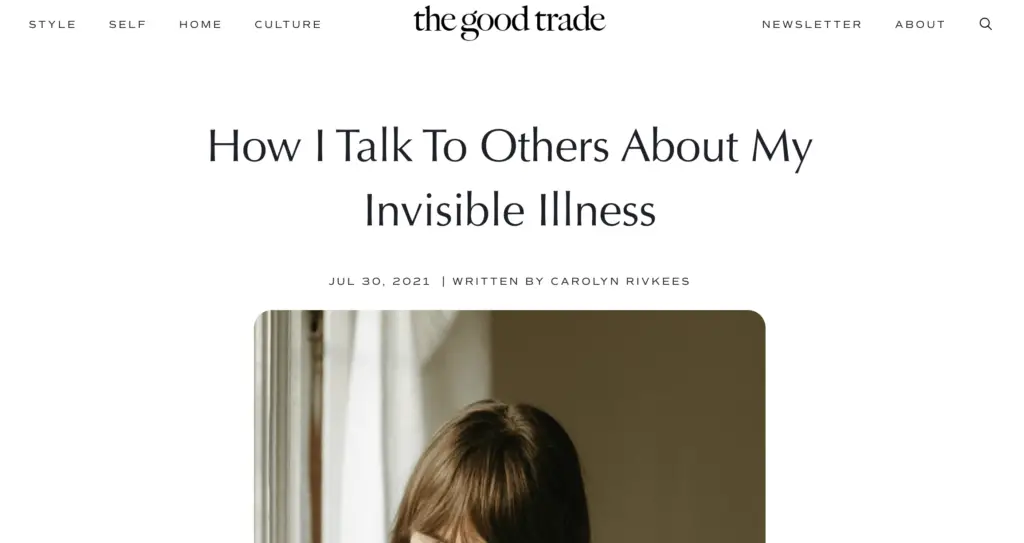
2. Allow yourself to feel all of the emotions – don’t make yourself feel guilty.
I felt like such a burden when I first found out about my chronic illness. I didn’t want to show how depressed, anxious, and angry I was. I thought that those negative emotions would make me seem like I was dramatic and overreacting.
I didn’t want my friends and family to think I had changed for the worse. But, I was fighting an internal battle and I spent so many days struggling, especially as I started treatments.
My advice is to let go and allow yourself to feel all of these feelings, good and bad. And don’t be afraid to share with your loved ones! If they really love you, they will always understand and lend an ear to listen. I personally have been so blessed by the support of my family, friends, and boyfriend.
Sometimes, when I do my treatment, I just want to cry. I want to sit there and feel sorry for myself. And oftentimes, I do! And that’s okay!
I never want to be stuck in a place of eternal sadness or negativity, but I am allowed to have my moments. I know that negative feelings are unavoidable in this life, and making myself feel guilty or ashamed will only make things worse.
Ever since my diagnosis, I have had my ups and downs, but I generally have been able to manage my disease a lot more easily as I got familiar with my new life and my feelings.
This article I wrote is a great resource for dealing with these tough emotions: “Navigating depression and anxiety after receiving a difficult diagnosis“

3. Feel empowered by taking control of your narrative – and choose when it’s best for you to share.
When I meet a new person, it’s always weird to wonder when I am going to share about my condition – if ever. I don’t feel like every single person who meets me needs to know. But, I do like to share with people close to me. I also feel that it is necessary to share in some instances, like to my supervisor at my job. Settings like work are a place where it is necessary for my condition to be known in case any special circumstances arise, which they always do!

Outside from instances where I feel that it is necessary to share, I always ponder how and when to bring it up. Many times, it is a natural progression of me getting closer to someone.

When I was diagnosed with my disease, I was not in a relationship. I was single, and I worried for so long that no one would want to put up with the highs, lows, and constant upkeep of my condition. I knew that I would need to rely on the my significant other to help me with things that close friends/family often helped me with. I needed someone who would take care of me after a surgery or help me with my plasma treatment.
It’s scary letting someone into your world, because you don’t always know how you will be perceived. Luckily, I ended up meeting someone who perfectly understood me and is always enthusiastic to help and take care of me. This was such a blessing, because I tried for so long to do everything alone.
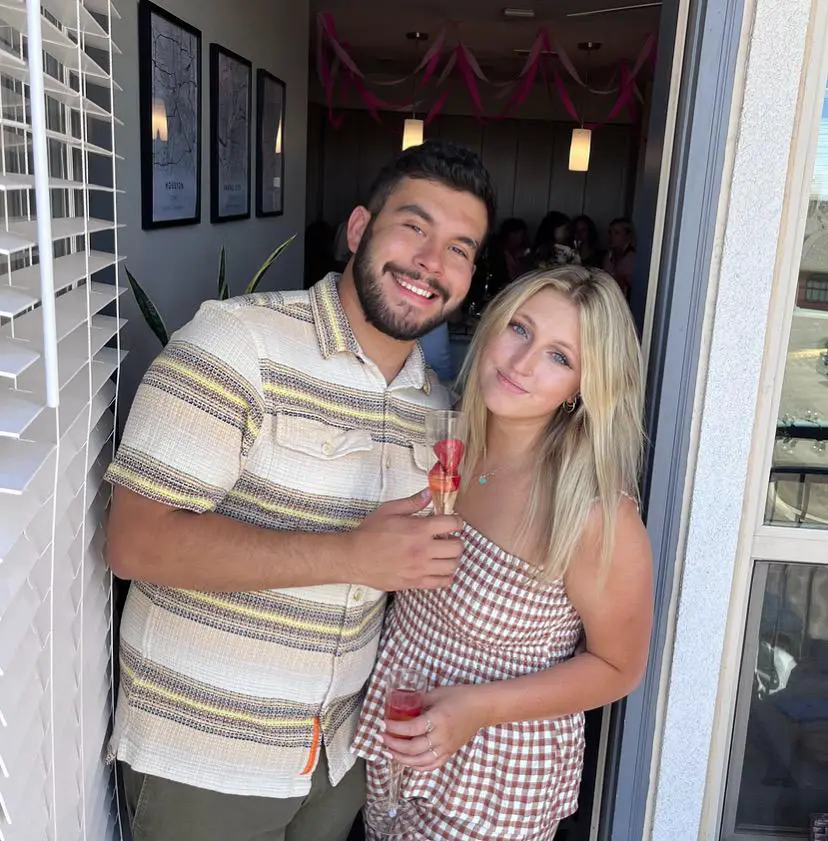
It can be awkward to bring it up at first when you are dating someone, but it is so worth it to share your feelings and experiences. It helped me so much because I knew that I needed to be with someone who would support me wholeheartedly!

Overall, your chronic illness is a part of your story, but it doesn’t define you. Let your strength and your experiences empower you! You are a strong person and you have a beautiful narrative. Don’t be afraid to own it!
It’s okay to be hesitant about sharing, but never feel ashamed about who you are. The people around you are going to support you in whatever you choose to share!


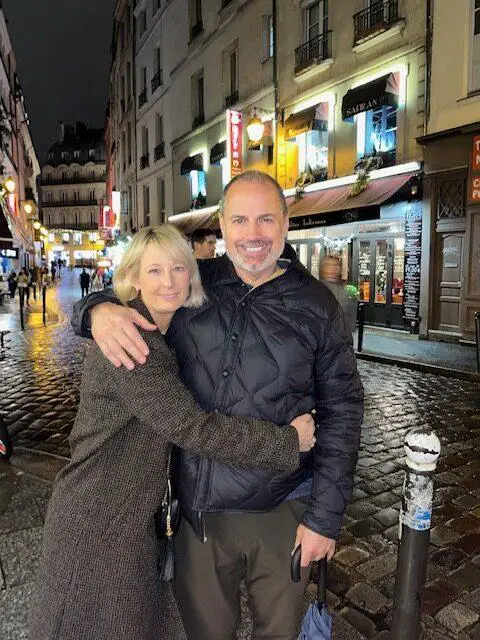
Overall, sharing about chronic illness can be really tough and uncomfortable. It can take years to figure out what the right steps should be. If you are struggling with this, I hope my advice helped a little bit! Here are some resources that I love:
From Cleveland Clinic – Chronic Illness
From Aging Care – How to Support a Friend who has a Chronic Illness
From Mind and Body – How to be a Supportive Partner to Someone with Chronic Illness


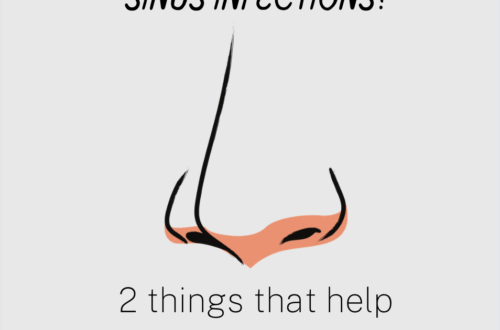

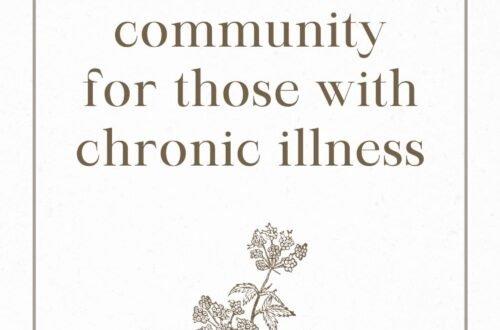

5 Comments
Pantea
I love your recommendation to do more research and allow yourself to feel your emotions. So often people are stuck in denial because they don’t allow themselves to grieve.
bunfuns
It is certainly difficult, even with very close friends and relatives.
Riyah Speaks
Allowing yourself to feel emotions is an important one! It’s hard to know how to talk to others about it, especially when you’re so afraid.
Belle
“Dr Google” definitely would love to have believe they are 2 breaths away from death! 🙈 so much great advice in your article. I’ve had a hard time with this new version of me since getting sick in 2021 – it’s been easier to shut myself away sometimes so I appreciate your tips and advice in this post
Cindy Bowden
Ohhh, Aubrey! I needed to read this article right now. I just had a positive ANA test result and I am going to a rheumatologist next month for further testing. Thank you for posting this!